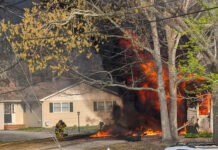
MONMOUTH COUNTY – A local man has been arrested and charged for squatting in two vacant homes, officials said.
Markies L. Wells, a.k.a. Messiah Law-Elbey, 39, with a last legitimate known address in Neptune Township, is charged with second-degree Armed Burglary, second-degree Attempted Theft, second-degree Theft, third-degree Burglary, third-degree Criminal Mischief, third-degree Resisting Arrest, third-degree Threatening to Kill Members of Law Enforcement, fourth-degree Falsifying or Tampering with Records, fourth-degree Obstruction of Justice, fourth-degree Possession of a Weapon for an Unlawful Purpose, fourth-degree Theft of Utility Services, fourth-degree Trespassing, and fourth-degree Unlawful Possession of a Weapon.
Back in March, Wells had climbed through a rear window of an abandoned home on Pine View Avenue and changed the locks on the front and rear doors, according to authorities. He was subsequently arrested and charged.
In July 2024, Wells had done the same thing with a foreclosed home on Middletown Road. Officials said he took up residence in the property, utilizing utilities that had not been turned off.
Wells also allowed his three pet dogs to cause extensive damage to areas inside the home, officials said.
At the time of his arrest, Wells was found to be in possession of a knife – where he threatened to kill the arresting officers.
A Monmouth County Superior Court Judge granted the State’s motion to keep him incarcerated at the Monmouth County Correctional Institution (MCCI) while the criminal cases against him proceeded.
Further investigation resulted in Wells also being charged with filing falsified documents with the Monmouth County Clerk’s Office, through which he claimed to be the rightful owner of both the Holmdel and Keansburg homes, officials said.
Anyone with further information about the activities of this defendant is asked to contact MCPO Detective Michael Acquaviva at 800-533-7443.
Despite these charges, every defendant is presumed innocent, unless and until found guilty beyond a reasonable doubt, following a trial at which the defendant has all of the trial rights guaranteed by the U.S. Constitution and State law.







